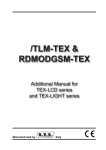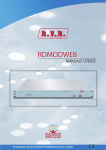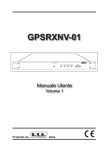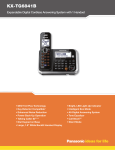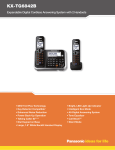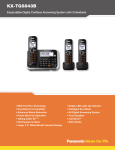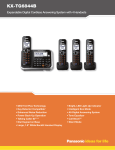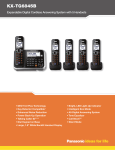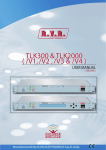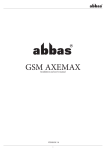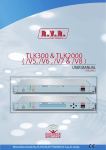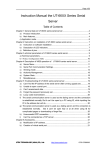Download RDMODGSM-TV
Transcript
RDMODGSM-TV Additional Manual for SAU/SAV & STU/STU series Manufactured by Italy File Name: 03_RDMODGSM-TV_ING_1.0.indd Version: 1.0 Date: 18/04/2008 Revision History Date Version 18/04/2008 1.0 Reason First edition Editor J. H. Berti RDMODGSM-TV - Additional Manual Version 1.0 © Copyright 2008 R.V.R. Television Via del Fonditore 2/2c - 40138 - Bologna (Italia) Phone: +39 051 6010506 Fax: +39 051 6011104 Email: [email protected] www.rvr.it Web: All rights reserved Printed and bound in Italy. No part of this manual may be reproduced, memorized or transmitted in any form or by any means, electronic or mechanic, including photocopying, recording or by any information storage and retrieval system, without written permission of the copyright owner. RDMODGSM-TV Table of Content 1. 1.1 1.2 1.3 1.4 2. 2.1 2.2 3. 3.1 3.2 3.3 4. 4.1 5. 5.1 6. 6.1 6.2 General Description Remote alarm monitoring Telemetry Remote control Arrangement of mains power supply SIM Card Specifications SIM card installation Remote alarm reporting configuration RDMODGSM-TV External Description Top view Bottom view Connector pinouts RDMODGSM-TV Module Identification Top View RDMODGSM-TV.USA Module Identification Top View Spare Parts RDMODGSM-TV RDMODGSM-TV.USA User Manual Rev. 1.0 - 18/04/08 1 1 3 3 5 6 7 8 13 13 14 14 16 16 17 17 18 18 18 RDMODGSM-TV This page was intentionally left blank ii Rev. 1.0 - 18/04/08 User Manual RDMODGSM-TV 1. General Description The external telemetry accessory support connectivity to the whole range of units of RVR’s SAU/SAV & STU/STU family of products. In the continuation, unless that for the different versions there are specific informations, the versions RDMODGSM-TV (external telemetry accessory for the SAU/SAV & STU/STU series) and its variant RDMODGSM-TV.USA (variant for american market) will be called simply RDMODGSM-TV. This section describes the features introduced with version RDMODGSM-TV (accessory for external telemetry) and the necessary steps for their proper configuration. The telemetry supports: • Remote alarm reporting by sending SMS messages through a GSM modem or through a PSTN modem (dial-up) by sending an alarm message string to a connected PC. • Telemetry, with all equipment parameters sent to the “TELECON” software through an RS232, GSM or PSTN connection; • Remote controlling through an RS232, GSM or PSTN connection to the “TELECON” software or through certain predetermined SMS messages. 1.1 Remote alarm monitoring Alarm generation parameters are listed below: • Equipment forward power (forward power good “PgD”); • Equipment reflected power (reflected power good “PgR”); • Unbalanced power; • Video Signal Level; • Audio 1 Signal Level; • Audio 2 Signal Level; • Mains voltage state (present or missing). Factory default settings are as follows: ALARM Forward Power (Fwd Pwr) Reflected Power (Rfl Pwr) Unbalanced Power Video Audio 1 Audio 2 Mains Power (Mains) TIME 25 Sec. 25 Sec. 25 Sec. 25 Sec. 25 Sec. 25 Sec. 25 Sec. THRESHOLD Power Good (PgD) Power Good (PgR) Table 1.1 User Manual Rev. 1.0 - 18/04/08 / 18 RDMODGSM-TV An inhibit time (start time) after power-on is provided to ensure false alarm prevention. When this inhibit time times out, the thresholds of alarm generation parameters are checked and remote alarms are sent if needed. Alarm generation technique is outlined in the figure below; remote alarm delay, i.e. the amount of time the system waits before issuing a remote alarm after an alarm condition occurs is indicated in table 1.1. When appropriate, a new line is added to the alarm log stored in RDMODGSM-TV, up to four lines maximum. Figure 1.1 The alarm log may be reviewed using the “TELECON” software or through SMS (see relevant section). WARNING: The mains alarm is triggered from the battery charger board; as a result, this board is required even when no batteries are installed. In the configuration without batteries, no alarm is generated; instead, an SMS message indicating a normal condition is sent upon next start-up. When any one of the parameters listed above changes state, a text message with the following information is sent via modem (if fitted): / 18 • Station Name. • Station ID. • State of measurements. EX1. Station Name ID:000 Forward Power OK Reflected Power OK Audio OK Mains OK Rev. 1.0 - 18/04/08 User Manual RDMODGSM-TV EX2. Station Name ID:000 Forward Power OK Reflected Power OK Audio OK, EXT FWD Power OK EXT RFL Power OK Mains OK - 1.2 Telemetry Equipment telemetry consists in the remote monitoring of all operating parameters and can only be achieved through serial cable or modem connection to the “TELECON” software. 1.3 Remote control When the exciter is connected to an internal or external telemetry unit, it can be controlled from a PC with a suitable modem connection. Fig.1.2: Example of Modem-to-PC connection The “TELECON” software establishes connection with the station through a phone line and enables the following remote operations: alarm reset, transmitter power on/power off, power supply reduction, dummy load testing, etc., data evaluation to locate possible faults, identification of parts required for repair. An alternative remote controlling option uses SMS messaging through a common GSM phone, in which case the equipment will respond as indicated in table 1.2. Before querying the system using SMS messages, establish a connection using the “TELECON” software and set the provider service centre number and the telephone numbers authorised to send these commands to the devices. User Manual Rev. 1.0 - 18/04/08 / 18 RDMODGSM-TV The external telemetry support the following commands: Command Response Description INFO Station Name: Station ID: FWD Power: RFL Power: Unb: Temp: TX: (string 16char max) (to 000 from 999) (Forward Power in W) (Reflected Power in W) (Unbalanced Power in W) (Temperature in °C) (On/Off) TXON Station Name: Station ID: Tx is ON (string 16char max) (to 000 from 999) Transmitter power-on TXOFF Station Name: Station ID: Tx is OFF (string 16char max) (to 000 from 999) Transmitter power-off ALARM Station Name: Station ID: Alarm: (string 16char max) (to 000 from 999) (Last 3 alarm list store in memory) RESET Station Name: (string 16char max) Station ID: (to 000 from 999) RESET stored Record RESMOD No response STATUS Resend alarm message VERSION Transmitter status information Alarm log Clear Alarm Log Resets and re-initialises modem Resend the alarm status information Station Name: (string 16char max) Station ID: (to 000 from 999) Release App, Release Bios, Release Pan, Table Code Software Version informations Table 1.2 / 18 Note: Response time to SMS commands may vary with different GSM network providers; as a general rule, response time should not exceed 7-10 minutes maximum. Rev. 1.0 - 18/04/08 User Manual RDMODGSM-TV 1.4 Arrangement of mains power supply WARNING: Disconnect mains power supply before beginning these procedures. The power supply unit (please see section 4.1 for a detailed description) has its own internal voltage selection block; check the voltage selection block to ensure that is properly rated for the power mains, if the mains is different from that specified in the process of order, and change it as required to match mains voltage. Check that the voltage value available corresponds with the voltage value setting on the equipment (also listed in Test Table), verifying, and possibly modifying appropriately with the equiment disconnected from the power mains, the position of voltage selection block place internally (see fig. 4.1 - position [5]) after the cover of the machine had been unscrewing. Fig.1.3: Position of voltage selection block inside the RDMODGSM-TV Move the position of the following wires given in the table below, only in case is necessary to change the value of power supply. Fig.1.4: Example of electrical connections to voltage selection block for 220 or 110V When all is done put the cover, putting all the screws, then connect the mains power connector (VDE) placed in the back of the equipment (see fig. 3.2 - position [1]).. User Manual Rev. 1.0 - 18/04/08 / 18 RDMODGSM-TV 2. SIM Card Specifications When you subscribe to a provider service, the operator issues a SIM card that contains all subscription details, such as PIN, any optional services available and so on. WARNING: The SIM card and its contacts are easily damaged if scratched or bent. Handle the SIM card with care when inserting or removing it. The SIM card to be inserted into the modem must be registered for Data & Fax Service (see facsimile contract shown below). SIM card configuration for DATA/FAX reception must meet the following specifications: - Asynchronous; - Transparent; - 9600 Baud. Fig.2.1: Subscription of Contract with Data/Fax option / 18 WARNING: Some SIM cards are preset to request the PIN code as a security protection feature; this will cause a Modem malfunction. Be sure to disable this security protection using a common cell phone. Rev. 1.0 - 18/04/08 User Manual RDMODGSM-TV 2.1 SIM card installation Follow the instructions provided below closely to ensure correct configuration of exciter connection: 1) If needed, cut off mains power supply to the external telemetry accessory. 2) Remove all screws on the top cover and remove cover. 3) Press the eject button to extract the SIM card holder from the modem slot accommodated inside the RDMODGSM-TV. Fig.2.2: How to extract a SIM card from an Internal Modem 4) Insert the SIM card into the card holder. Make sure the cut-off corner of the card is in the correct position so the SIM card will lock into place inside the card holder and its golden contacts will be facing in the correct direction when the SIM card slides into place in the equipment. 5) Insert the SIM card into the modem accommodated inside the RDMODGSMTV. 6) Refit the top cover and tighten all screws you had removed previously. 7) Connect a DB9 cable across the “RS232” connector on the front panel of the external telemetry accessory and the PC. 8) Connect the GSM modem antenna to the N-type connector “GSM ANT” on the rear panel of the RDMODGSM-TV. Use a broadband Yagi log-periodic directional antenna (700- 900 MHz). 9) Connect a DB15 cable across the “PTX-LCD REMOTE” connector on the rear panel of the external telemetry accessory and the “REMOTE” connector on the rear panel of the exciter. 10)Connect mains power supply to the VDE connector on the rear panel of the external telemetry accessory to power on the telemetry accessory. 11)Programme the internal EEPROM using the “TELECON” software. User Manual Rev. 1.0 - 18/04/08 / 18 RDMODGSM-TV 2.2 Remote alarm reporting configuration Firstly, you will have to set certain parameters in the external telemetry accessory using the “TELECON” software. Connect the PC serial port COM to the RS232 connector on the front panel of the RDMODGSM-TV using a standard Male DB9 - Female DB9 serial cable. Fig.2.3: Connection between STU/STV and multi SAU/SAV with RDMODGSM-TV and PC / 18 Rev. 1.0 - 18/04/08 User Manual RDMODGSM-TV Fig.2.4: Connection between STU/STV and single SAU/SAV with RDMODGSM-TV and PC When using the “TELECON” software for the first time, select the station and then enter: • COM port used, • Baud rate (set to 9600), • type of connection (set to direct, via cable). When you have entered the correct data, click the “Start” button to confirm and the “TELECON” main screen appears, as shown in the figure: User Manual Rev. 1.0 - 18/04/08 / 18 RDMODGSM-TV Use this screen to change Start time. To edit this parameter, click the “TStart” box with the left mouse button (default setting is 300sec., the equivalent of 5 min.); this opens a window where you can change the setting. Press Enter to confirm. Double click the green label in the top left corner of the TELECON screen and select “Eeprom” (as shown in the figure below). In the open menu, press this key to view station parameters. 10 / 18 • Select the “General” data category and set the 5 parameters: • STATION ID: Station identifier; • STATION NAME: (max 18 characters); • DIAL STRING: required setting for a GSM modem is ATDT; • NUMBER OF RETRY: number of alarm transmission repetitions; • SERVICE CENTER NUMBER: number of GSM provider service centre for SMS transmission and reception; place country code before number. Rev. 1.0 - 18/04/08 User Manual RDMODGSM-TV Example with Italian service providers: TIM: +393359609600 VODAFONE: +393492000200 WIND: +393205858500 Now select the “Telephone” data category and set the following: User Manual Rev. 1.0 - 18/04/08 11 / 18 RDMODGSM-TV • PHONE NUMBER: GSM phone numbers recognised by the station to which you want the alarms sent; • SMS: select “YES” to enable transmission of SMS commands to system; • ACS: select “YES” to enable SMS reception. Note: For correct transmission, place country code (+XX) before set numbers (Use +39 for Italy). When all parameters are set, press this key and external Telemetry accessory will store the information. When finished, click “Exit” to exit the remote station programming window. Back into “TELECON” standard interface, click the “General” measurement selection button to set thresholds and operation times for the various alarms according to the principles outlined in Section “Alarm Management”. 12 / 18 Note: When setting alarm thresholds, allow a margin of some percent points with respect to normal operation parameters. Rev. 1.0 - 18/04/08 User Manual RDMODGSM-TV 3. RDMODGSM-TV External Description This section describes the components found on the front and rear panel of the RDMODGSM-TV. 3.1 Top view Figure 3.1 [1] ON [2] ALARM [3] MODEM [4] SMS [5] COM [6] RS232 [7] LOCAL [8] WAIT [9] RS232 [10] MODEM User Manual Green LED, turns on when the equipment is connected to mains power supply. Red LED, turns on when an alarm detected by the telemetry system is present. Green LED, turns on when modem is connected. Yellow LED, indicates that SMS messaging is active. Yellow LED, indicates the remote communication, or rather telephone connection through TELECON software Yellow LED, indicates that communication via RS232 serial port is in progress. N.C. (Provided for future expansion). Yellow LED, when on, indicates that Start time is active. No alarm messages will be sent until this LED turns off. DB9 connector connected to telemetry unit (SAU/SAV and STU/STV series <->PC). DB9 connector connected to GSM Modem (PC <-> Radio Modem Box -TV). Rev. 1.0 - 18/04/08 13 / 18 RDMODGSM-TV 3.2 Bottom view Figure 3.2 [1] MAINS IN VDE mains power supply connector [2] 24 VDC Jacks (red - black) for 24V DC output. [3] GSM ANTENNA N-type connector for antenna connection. [4] AUDIO ADJ. Trimmer for audio input level adjustment. [5] AUDIO IN Audio input female jack connector. [6] EXT. TELEMETRY N.C. (Provided for future expansion). [7] AMPLIFIER TELEMETRY N.C. (Provided for future expansion). [8] PTX-LCD REMOTE DB15 connector for telemetry connection to SAU/SAV and STU/STV series. [9] RS485 DB9 connector for RS485 communication. [10] RS232 DB9 connector for communication interface to external devices. [11] I2C DB9 connector for I2C communication. 3.3 Connector pinouts 3.3.1 RS485 Type: DB9 female 1 2 3 4 5 6 7 8 9 14 / 18 N.C. (internally not connected) B A N.C. (internally not connected) GND N.C. (internally not connected) N.C. (internally not connected) N.C. (internally not connected) N.C. (internally not connected) Rev. 1.0 - 18/04/08 User Manual RDMODGSM-TV 3.3.2 RS232 Type: Male DB9 1 2 3 4 5 6 7 8 9 NC TX_D RX_D NC GND NC NC NC NC 3.3.3 I2C Type: Male DB9 1 2 3 4 5 6 7 8 9 NC SDA (Serial DAta) SCL (Serial CLock) NC GND NC NC NC NC 3.3.4 PTX-LCD Remote Type: Male DB15 1 2 3 4 5 6 7 8 9 10 11 12 13 14 15 User Manual Interlock Ext AGC FWD GND SDA IIC VPA Tlm FWD tlm Power Good GND GND Ext AGC RFL SCL IIC IPA Tlm RFL Tlm On cmd OFF cmd Rev. 1.0 - 18/04/08 15 / 18 RDMODGSM-TV 4. RDMODGSM-TV Module Identification The RDMODGSM-TV is made up of several modules connected through connectors to facilitate maintenance and replacement (if needed). 4.1 Top view Figure 4.1 shows a top view of the equipment and component locations. Figure 4.1 [1] [2] [3] [4] [5] [6] [7] [8] [9] [10] 16 / 18 12V 2.1AH lead buffer battery (BATTPG12V2A2). Voltage selection block 220/110V. Main and Power Supply Add-On Board (SLINTGSMBOX4). /FILGSM-RDMODGSM opt., GSM band filter board (FLMGSM900MHZ). Transformer (TRFRMBOX). 12V 2.1AH lead buffer battery (BATTPG12V2A2). CPU16Bit Board (SLCPU16V2TEX). CPU16Bit Interface Board (SLCPU16V9TEX). LED Board for CPU16bit (SLCPU16LED01). Wavecom GSM Modem (MODGSMWM02B). Rev. 1.0 - 18/04/08 User Manual RDMODGSM-TV 5. RDMODGSM-TV.USA Module Identification The RDMODGSM-TV is made up of several modules connected through connectors to facilitate maintenance and replacement (if needed). 5.1 Top view Figure 5.1 shows a top view of the equipment and component locations. Figure 5.1 [1] [2] [3] [4] [5] [6] [7] [8] [9] [10] User Manual 12V 2.1AH lead buffer battery (BATTPG12V2A2). Voltage selection block 220/110V. Main and Power Supply Add-On Board (SLINTGSMBOX4). /FILGSM-RDMODGSM opt., GSM band filter board (FLMGSM900MHZ). Transformer (TRFRMBOX). 12V 2.1AH lead buffer battery (BATTPG12V2A2). CPU16Bit Board (SLCPU16V2TEX). CPU16Bit Interface Board (SLCPU16V9TEX). LED Board for CPU16bit (SLCPU16LED01). Wavecom GSM Modem (MODGSMWM02BUSA). Rev. 1.0 - 18/04/08 17 / 18 RDMODGSM-TV 6. Spare Parts 6.1 RDMODGSM-TV Maintenance Subset Main and Power Supply Add-On Board SLINTGSMBOX4 CPU block KCPU16VRMBOX GSM band filter board option /FILGSM-RDMODGSM Parts of use Transformer 12V 2,1AH lead buffer battery GSM Wavecom Modem TRFRMBOX BATTPG12V2A2 MODGSMWM02B 6.3 RDMODGSM-TV.USA Maintenance Subset Main and Power Supply Add-On Board SLINTGSMBOX4 CPU block KCPU16VRMBOX GSM band filter board option /FILGSM-RDMODGSM Parts of use Transformer 12V 2,1AH lead buffer battery GSM Wavecom Modem 18 / 18 TRFRMBOX BATTPG12V2A2 MODGSMWM02BUSA Rev. 1.0 - 18/04/08 User Manual























